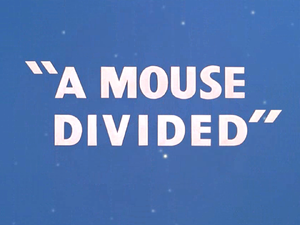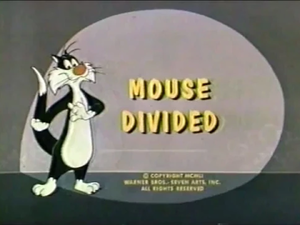A Mouse Divided
| A Mouse Divided | |
|---|---|
| Production company | Warner Bros. Cartoons |
| Distributor | Warner Bros. Pictures The Vitaphone Corporation |
| Release date | January 31, 1953 |
| Run time | 6:30 |
| Starring | Mel Blanc Bea Benaderet[1] |
| Producer(s) | Edward Selzer John W. Burton[1] |
| Music composition | Carl Stalling |
| Story | Warren Foster |
| Animation | Arthur Davis Manuel Perez Virgil Ross Ken Champin |
| Director(s) | I. Freleng |
| Series navigation | |
| ← Previous | Next → |
| Title card | |

| |
| Second title card | |

| |
A Mouse Divided is the three-hundredth and fifteenth Merrie Melodies theatrical short. It was distributed by Warner Bros. Pictures and The Vitaphone Corporation on January 31, 1953. It was written by Michael Maltese, produced by Edward Selzer and John W. Burton, and directed by Friz Freleng.
A drunk stork mistakenly delivers a baby mouse to Sylvester and his wife. Despite Sylvester's initial hesitance to take care of the mouse, his eventual prospect leads to trouble when it attracts the attention of other cats in the neighborhood.
Detailed summary
Memorable quotes
Mrs. Sylvester: Isn't it strange that we never have a little bundle from heaven?
Sylvester: Thufferin' thuccotash! Don't start that patter of little feet around the house stuff again. I'm busy.
Mrs. Sylvester: Ooh, hoo, hoo! I work and I slave...
Sylvester: "And what thanks do I get? I wish I was dead! Yoo, hoo, hoo!" Every day it's the same thing - pitter-patter of little feet!
Mrs. Sylvester: Aww, he called me Mama. Isn't he cute?
Sylvester: Cute? He's delicious!
Mrs. Sylvester: Sylvester, how could you?! After all he's just a baby. Even if he's a mouse, he's ours.
Sylvester: Yours and mine? You're a gambling woman. What would you take, heads or tails?
Mrs. Sylvester: Ah! You beast! You cannibal! How could you!? Mouse or no mouse, he's our son.
Sylvester: A fine thing... I've become a father of a breakfast.
Baby mouse: Daddy!
Sylvester: Aww... He called me Daddy.
Salesman cat: Good day, Sir. I represent the Little Giant Vacuum Cleaner Company of Walla Walla, Washington. And if you watch closely, you'll notice the powerful action of this machine as it removes completely and forever all foreign particles from around the room. I realize you may not be ready to purchase the Little Giant right now but if you ever do, just remember the Little Giant Vacuum Cleaner Company of Walla Walla, Washington.
Drunk Stork: Boy, did that mouse grow!
Mother mouse: Well, nothing like this ever happened in my side of the family.
Characters
In order of appearance: | ||||||||||||||||||||||
| ||||||||||||||||||||||
Organizations
- Little Giant Vacuum Cleaner Company
Locations
- Earth
- Stork Club
- United States
- Sylvester's residence
- Mouse couple's residence
- Washington (mentioned)
- Walla Walla (mentioned)
- Heaven (mentioned)
Objects
- Cutting table
- Cleaver
- Diaper
- Baby powder
- Pepper
- Vinaigrette
- Iceberg lettuce
- Clothespin
- Sliced bread
- Vacuum cleaner
- Vinyl record player
- Dynamite tied to balloon
- Giant log
- Fishing hook
- Cheese
Vehicles
- None
Production
Filming
It was copyrighted in 1951 (MCMLVI).
Music
The music was composed by Carl W. Stalling.
The short also contains the following music cues:
- "He's a Jolly Good Fellow" - Drunk Stork's leitmotif and arrival
- "Wiegenlied" ("Lullaby"; "Cradle Song") by Johannes Brahms - Baby mouse's reveal
- "A Cup of Coffee, a Sandwich and You" by Joseph Meyer - Sylvester wrapping the baby mouse like a sandwich
- "The Fountain in the Park" ("While Strolling Through the Park") by Ed Haley - Sylvester taking a stroll with his baby in the sidewalk
- "Jingle Bells" - A cat dressed as Santa Claus coming down the chimney
Crew credits
- Layouts: Hawley Pratt
- Backgrounds: Irv Wyner
Release
Dates are in order of release:
- United States: January 31, 1953
Behind the scenes
- The title is a play on Abraham Lincoln's "House Divided" speech, in which Lincoln delivered the remark, "A house divided against itself cannot stand," at the Illinois State Capitol on June 16, 1858. The line itself comes from the 25th verse in the twelfth chapter of the Gospel of Matthew, in the New Testament.
- The Stork Club in the short is named after the actual nightclub of the same name, which existed in Manhattan, New York from 1929 to 1965.
- A night club of a similar name also appeared previously in the 1946 Looney Tunes short Baby Bottleneck.
- The stork of this short is a reworking of a similar character in Baby Bottleneck, although unlike the one in this short, the stork in the latter is a Jimmy Durante-esque caricature.
- The voice of the stork is modulated with a higher pitch, making him sound like a drunken Daffy Duck.
- This short serves as a slight commentary of the post-war baby boom in the mid-20th century, which was a concept previously explored in shorts like Baby Bottleneck and Gorilla My Dreams.
- The short takes place in the month of July.
- It is the first Merrie Melodies short released in 1953.
- The short was submitted for consideration for an Academy Award in 1952, but was never nominated.[2]
Error
Legacy
- The drunken stork would later make a number of appearances in Friz Freleng's shorts, including Goo Goo Goliath, Stork Naked, Pappy's Puppy, and Apes of Wrath. Unlike his appearance in A Mouse Divided, the stork spoke in more or less his natural speaking tone in these later cartoons.
- Sylvester's wife appears again in Goldimouse and the Three Cats, but in a character design that resembles closer to her husband.
- This short was used in the feature film Daffy Duck's Fantastic Island, as part of Sylvester and his wife's wish. In the film, the short's beginning scene was ommitted to cut straight into Sylvester's house, and the ending was changed so that the stork delivers Sylvester back to the island.
Home availability
- In the United States:
- October 7, 1985: Warner Home Video releases A Salute to Friz Freleng on VHS
- May 18, 1994: Warner Home Video releases Sylvester and Tweety's Bad Ol' Putty Tat Blues on LaserDisc
- May 30, 2024: Warner Archive Collection releases Looney Tunes Collector's Choice: Volume 1 on Blu-ray disc
- In the United Kingdom and Ireland:
- January 1985: Warner Home Video releases The Looney Tunes Video Show: Volume 9 on VHS
References
- ↑ 1.0 1.1 Webb, Graham (2011). The Animated Film Encyclopedia: A Complete Guide to American Shorts, Features and Sequences (1900-1999), p. 235. McFarland & Company, Inc. ISBN 978-0-7864-4985-9.
- ↑ Beck, Jerry (May 11, 2017). "Cartoons Considered For An Academy Award – 1952". Cartoon Research. Retrieved July 28, 2024.